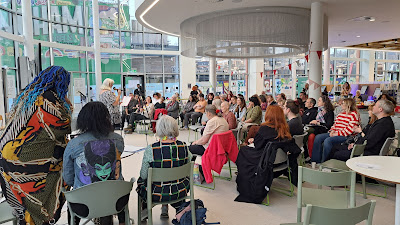On Writing and Re-Writing (Kingmaker R&D)
I’ve just sent two weeks thinking, writing, re-thinking and re-writing.
A couple of weeks’ ago, our creative team did a week of research and development, working on the script for a new play that I wrote earlier this year.
By the end of the first week of R&D, we’d removed the interactive elements, improved the narrative pacing, moved the interval, added five new scenes, and completely re-imagined the ending!
All in a week's work!
The next stage of the project is a sharing of the show with industry professionals and invited guests on Friday 6th September. So, I had two weeks to do all the re-writes, before rehearsals started up again.
Given how many notes I’d made, and how many changes we'd initiated, it seemed like a Herculean task. So, I did what I always do when faced with a monumental writing commission.
I procrastinated.
One clean bathroom, two mowed lawns, and email inbox clear-out, and a fully-hoovered house later, I figured I’d really better get on with it.
 |
| The Scripts, ready to go! |
A lot of the changes involved fleshing-out characters, adding more story beats, and rationalising jokes and situations no longer worked. For example, there was a moment in the story where one character stops everything to play a game with the audience. This was a really fun idea, but it came at a crucial point in the plot, and it was really damaging the momentum of the show. So, we axed it!
There was another point in the story where our main character, Fiona, was panicking about the mess she’d gotten herself into. When Fiona experiences heightened emotions, she slips into verse, and the poem in this particular scene just didn’t have the right emotional weight to it. So, I rewrote the poem to reflect where here emotions would be in that moment.
One of the things that I’ve found really challenging about writing for theatre is that you’re considering both what the characters are saying and what they’re not saying. You have to be able to convey the plot, character and emotional tone of a scene without the characters spilling their guts every five seconds. In this instance, stage directions are your friend.
But, there’s a balancing act here too: you need to be able to trust the actors and the director to interpret the text and convey the subtext without any hand-holding, while still having an idea of the movements, scenery and context of the story.
I'm definitely not a master playwright by any means, but I’ve already learned so much. And I’m really enjoying having more space to tell a longer story (even if it is a very silly one like this!)
And the play is already so much stronger for having other theatre professionals give their views and suggestions.
There are a few jokes that I loved in the script that haven’t made it to this revised version – mostly because they didn’t make sense temporally or narratively – and that took a bit of getting used to.
But, as a famous writer once said, “Kill your darlings”. That is, don’t be precious about cutting things that don’t work, just because you like them.
Obviously, this only applies to creative works, and not to your family members… But, yes, I have killed a few of my darlings on this re-write, and the script is all the better for it!
 |
| Just some of the notes from the first week of the R&D |
Thanks again to Arts Council England and the Fenton Arts Trust for financially supporting the project, and to Mansfield Palace Theatre for providing our upcoming rehearsal space too!
 |



Comments
Post a Comment